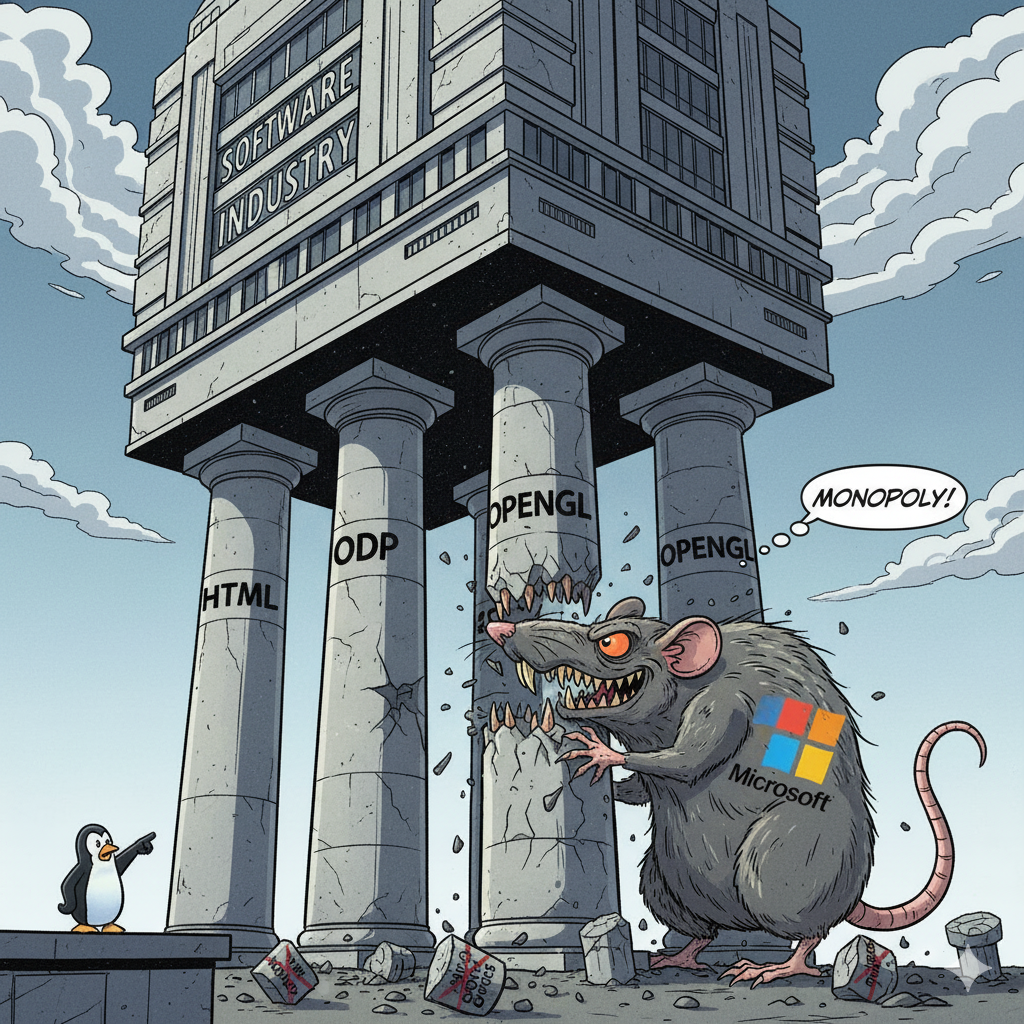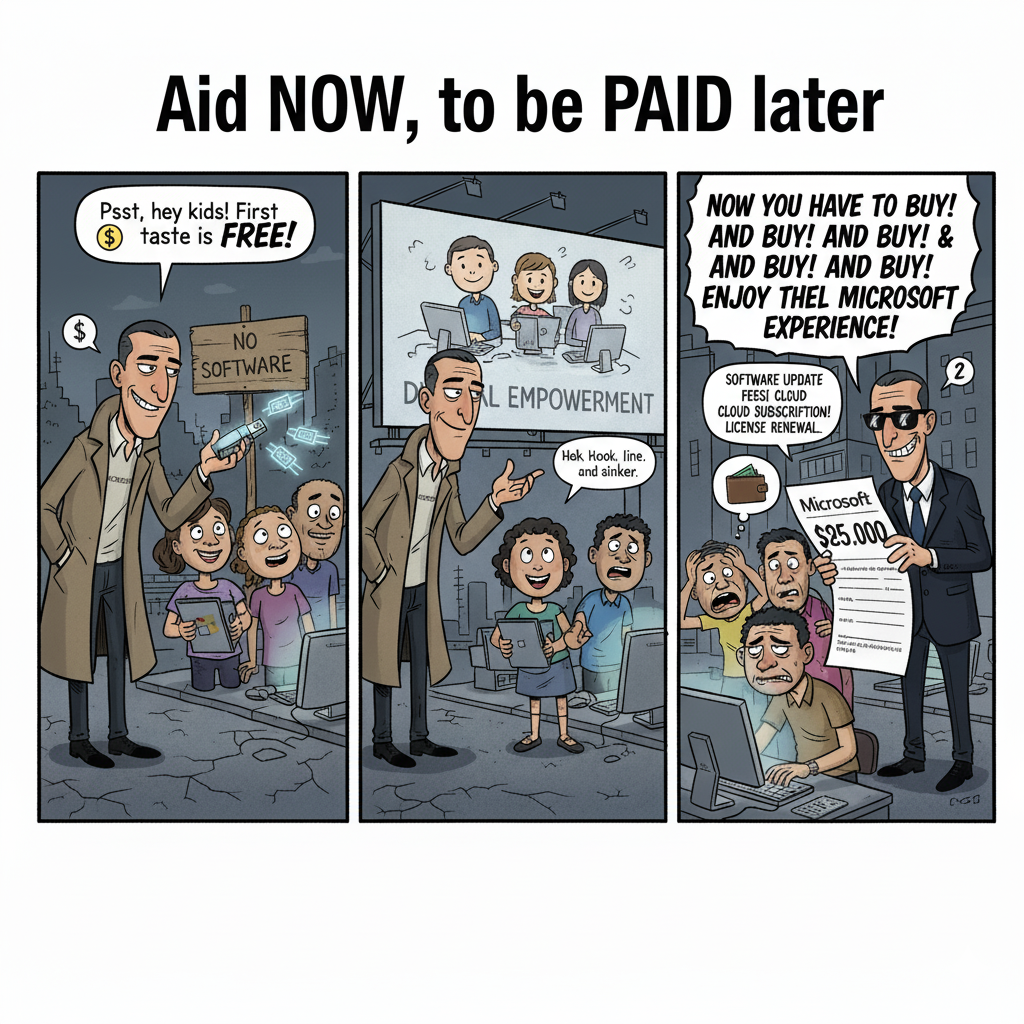
When power grows too strong to be challenged directly, humor becomes the weapon of the powerless. Satire exposes the absurdity of oppression by laughing at it. It punctures the illusion of authority without needing armies or slogans. The Windows Desktop Operating System scenario depicted using several cartoons, made by giving ideas to the Gemini AI. I asked it to assess the element of truth in my observations and got this Reply from Gemini
Why to criticise only one company ?
Not because I am holding shares of the other companies. Microsoft differs from companies like IBM, Google, and Sun mainly in its obsession with platform control rather than innovation or open standards. While IBM focused on enterprise hardware and services, Google on data and advertising, and Sun on open technologies like Java and OpenOffice, Microsoft built its empire by locking users into its proprietary ecosystem. It often twisted or fragmented open standards to preserve dominance, turning interoperability into dependency. Unlike IBM’s cooperative stance or Google’s data-centric openness, Microsoft’s strength lies in monopolizing access, not inventing technology. It has done harm to many computer users including me. This effort is to remind all about the danger.
The upgrades are forced on the users. Those who are comfortable with the present features are forced to upgrade by discontinuing support.


Every major Windows release raises hardware requirements — Windows 11, for example, demands TPM 2.0, Secure Boot, and newer CPUs. These changes instantly obsolete millions of otherwise functional PCs, forcing users to buy new machines. Hardware makers (Intel, AMD, OEMs like Dell, HP, Lenovo) benefit enormously from this artificial demand.
Microsoft sells Windows licenses primarily to OEMs, not end users. Each new Windows version means a new round of licensing deals and pre-installs. So when a hardware vendor sells a new PC, Microsoft gets paid automatically. Both sides profit from the forced upgrade loop — one sells hardware, the other sells software licenses.


Closed file formats lock users into specific software, making them dependent on a single vendor to access their own data. Over time, this creates vendor lock-in, where switching to another program or system becomes costly or impossible. Such formats also risk data loss and incompatibility, especially when the original software is discontinued. In contrast, open formats like ODF or PDF/A ensure long-term access, interoperability, and true ownership of your information.

Access to source code is essential for truly learning computer science because it exposes how software actually works, not just how to use it. Without source code, students can only treat programs as black boxes, unable to study algorithms, data structures, or design principles in practice. Reading and modifying real code builds problem-solving skills, debugging ability, and a deeper understanding of system architecture. In short, computer science without source code is like studying biology without ever seeing a living cell — theory without reality.

In the past the MSWindows pre-installed computers came along with the installation CD. It enables you to re-install Windows or repartition your hard disk as you wish. This allowed the users to explore other operating systems also. To prevent this possibility, they stopped giving the installation media and gave a recovery CD/partition instead. This is obviously a Microsoft ploy to prevent the users exploring other options.


Microsoft coerced hardware manufacturers into adding a so-called Secure Boot feature that blocks the installation of any system not signed off by Microsoft. Only after strong backlash did they allow it to be disabled — hidden behind layers of obscure settings. Their claim of “security” is just a smokescreen; the real aim is to lock out competition and tighten their monopoly.
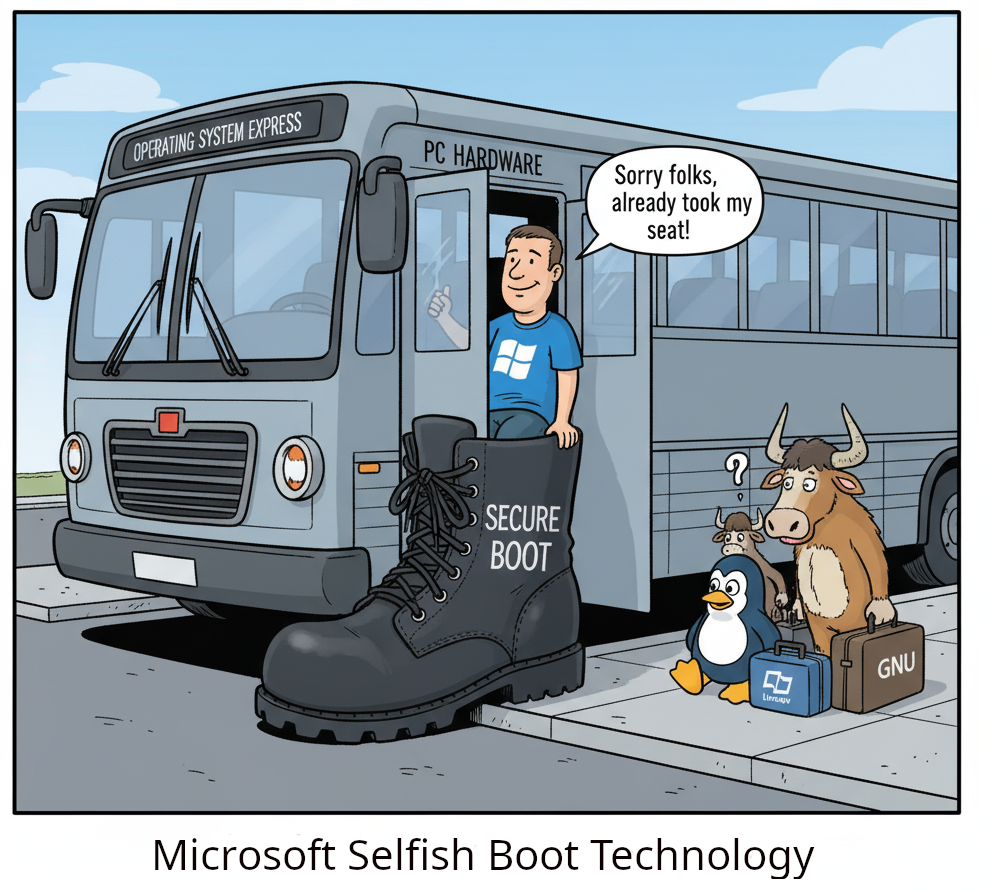

Monetizing user data has become the new business model. You don’t pay directly for Android or Google Maps — instead, your personal data funds them. With Windows 11, Microsoft has followed the same path, but with even greater intrusion and a heavier financial burden on users.
Microsoft has deliberately made it difficult to install Windows 11 without linking the system to a Microsoft account. Unlike earlier versions, where users could easily create a local account, Windows 11 hides or blocks that option during setup. The installer now demands an internet connection and forces you to sign in with a Microsoft account before proceeding. This move effectively removes user choice, ties every installation to Microsoft’s ecosystem, and allows them to collect and track more user data.

In Windows 11, most data collection and telemetry features are enabled by default, meaning the system begins gathering information about user activity, preferences, and behavior as soon as it’s installed. These settings are often buried deep within menus, described in vague terms, or scattered across different sections of the interface. As a result, most users either overlook them or don’t fully understand what kind of data is being transmitted. This silent default configuration ensures that Microsoft continues to receive detailed analytics and personal usage patterns from the majority of users — often without their explicit awareness or consent.

Windows 11’s telemetry system collects extensive data, including device and system details, application usage, compatibility reports, user feedback and ratings, browser history and activity, location information, and Microsoft Store interactions. All this happens continuously in the background. Since Windows is closed source, no one outside Microsoft can verify the full extent of what’s being collected or how it’s used. This lack of transparency raises serious concerns about privacy, control, and the true ownership of the data generated by users on their own computers.

The new AI features powered by Copilot will significantly raise the hardware requirements for Windows systems. Based on Microsoft’s past behavior, it’s likely that these upgrades won’t remain optional for long — they’ll eventually be pushed onto all users, whether they want them or not. This will force many people to replace perfectly functional hardware or buy new licenses, leading to unnecessary costs and electronic waste, all in the name of keeping up with Microsoft’s latest “requirements.”

All these changes are imposed under the pretext of protecting user data, but the reality tells a different story. Windows remains the only major operating system that cannot function safely without external antivirus software — a sign of its deeply rooted security flaws. The irony is striking: while claiming to “secure” users, Microsoft enforces restrictive controls and data collection that benefit itself far more than the user.

Bugs are cracks in the digital armor of an OS — and viruses are the water that seeps through them. The more bugs an OS has (and the slower they’re fixed), the more vulnerable it becomes.
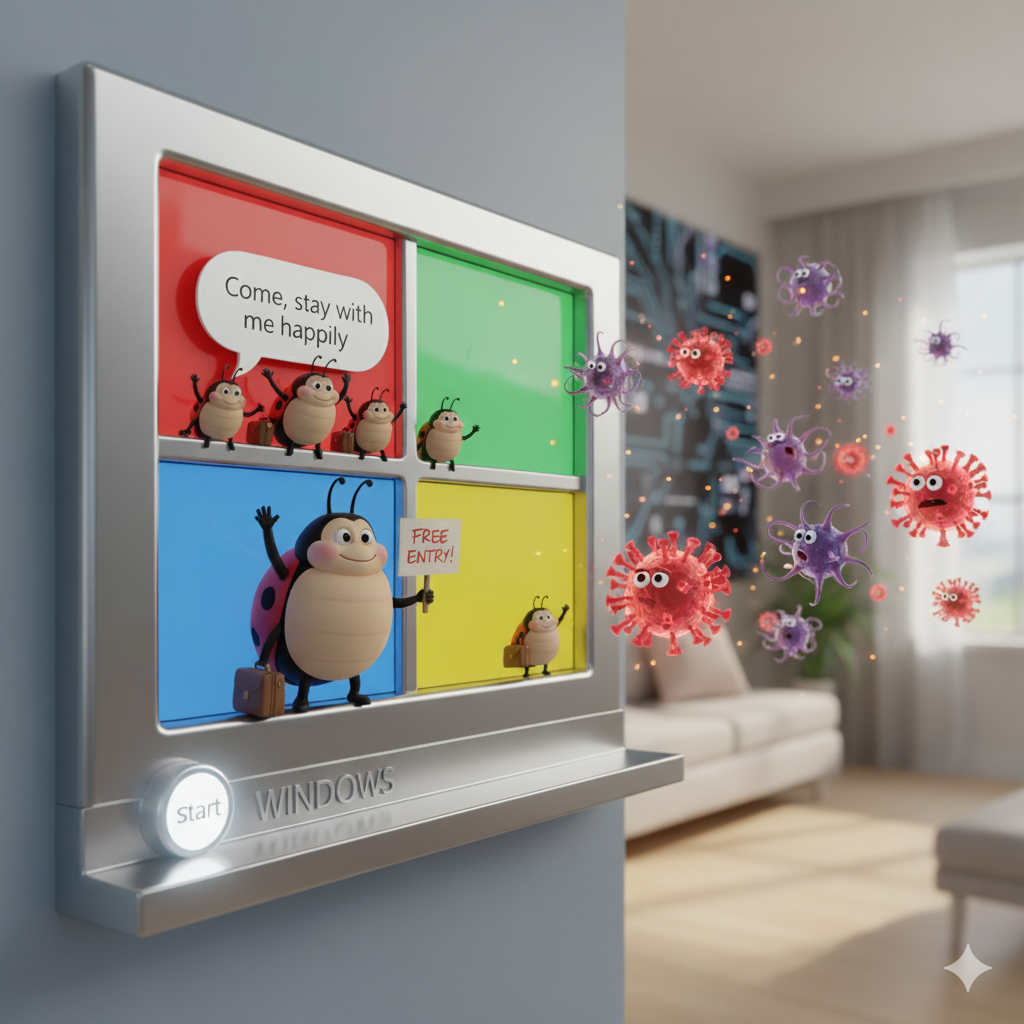
Windows 11 represents a shift from the idea of a personal computer to a controlled terminal. Every design choice — from mandatory Microsoft accounts to forced updates, cloud integration, telemetry, and AI features like Copilot — reduces user autonomy and increases Microsoft’s grip. The user is no longer the one in control; the OS decides when to update, what to install, what to share, and how the interface behaves. Even your local settings can be silently reset after an update.
By constantly linking the user’s identity, data, and workflow to Microsoft’s cloud, Windows 11 effectively turns people into puppets on digital strings
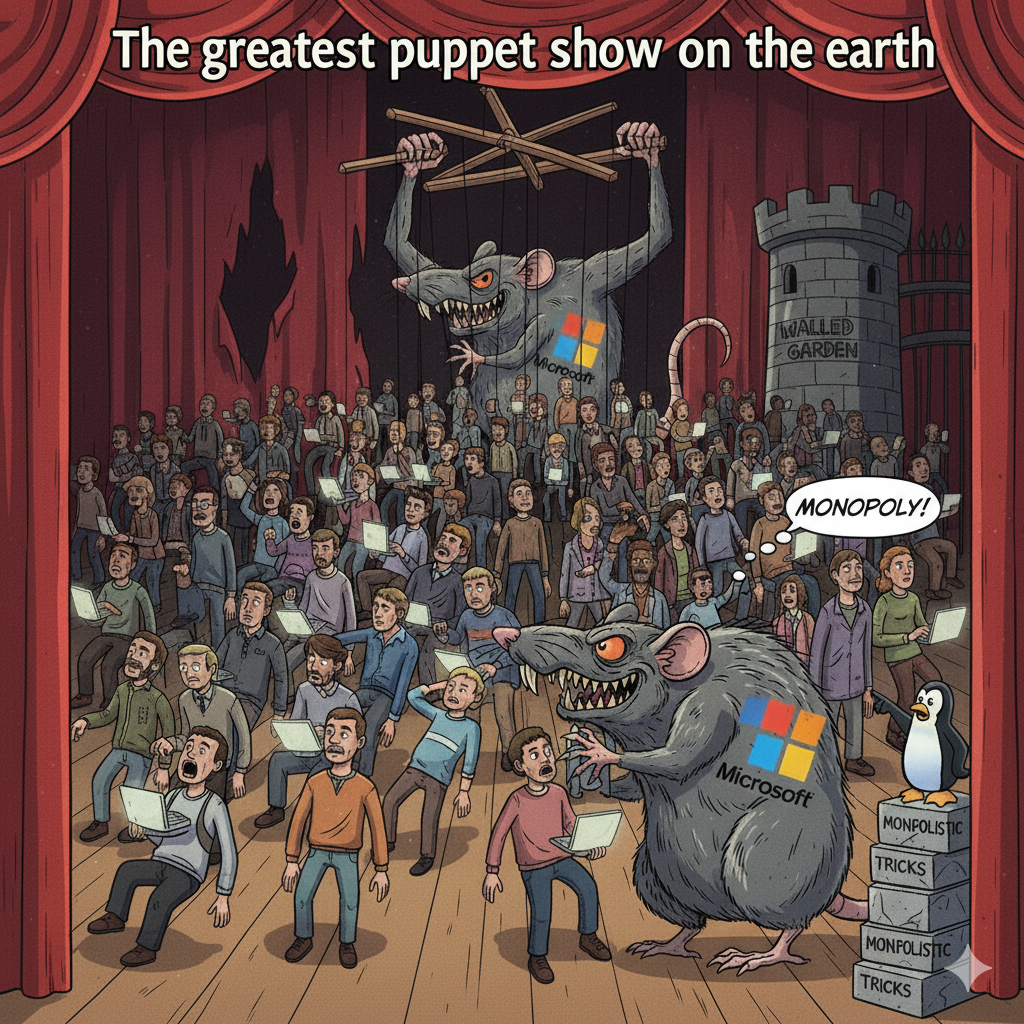

Many organizations and public institutions stick to Windows and Office out of habit, compatibility fear, or lack of awareness — not technical superiority. Microsoft exploits that inertia to maintain dominance. The GNU/Linux operating system already dominates servers, supercomputers, and even Android-based mobile devices — yet it’s still underused on desktops. This is unfortunate, because modern GNU/Linux distributions offer powerful and user-friendly desktop environments, along with fully Free and Open Source alternatives to nearly all essential applications: web browsers, office suites, media players, graphics tools, and more. In short, everything most people need is already available — without surveillance, licensing traps, or forced updates.
Using a Live USB stick, one can experience the GNU/Linux operating system and applications without installing it on a computer. The system runs from the USB stick instead of the hard-disk. An ISO image to make a Live USB stick is available. It is based on Linux Mint distribution is.

GNU/Linux distributions are not competing products — they are different expressions of freedom, giving users choice over how their computers serve them, not the other way around.

GNU/Linux is secure by design, built on strong user permissions, transparent code, and a community-driven development model. Unlike Windows, it is not dependent on third-party antivirus software to stay safe. Its security comes from its architecture — not from constant patching or afterthought protection tools.
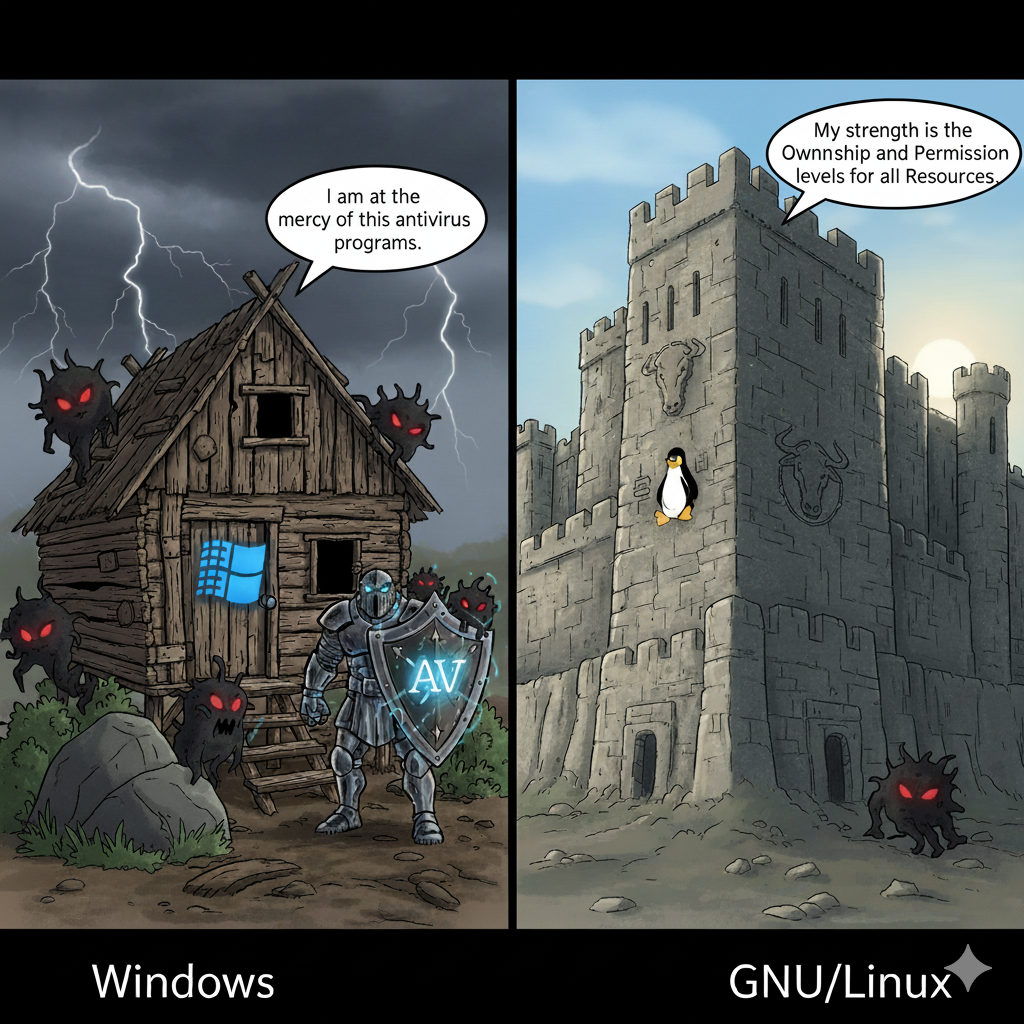
GNU/Linux revolutionized the supercomputer, server, and cloud landscape, becoming the backbone of modern computing infrastructure. Today, nearly every supercomputer and the majority of servers and cloud platforms run on Linux because of its stability, performance, and freedom from vendor control. The only area still lagging behind is the desktop, largely due to preinstalled proprietary systems and lack of user awareness — not because GNU/Linux is lacking in capability or usability.

GNU/Linux is highly efficient and lightweight, requiring far fewer hardware resources than proprietary operating systems. It can breathe new life into older computers that struggle with modern versions of Windows. Its flexibility is unmatched — the same system that powers supercomputers can also run smoothly on Single Board Computers like the Raspberry Pi, making it ideal for education, experimentation, and low-cost computing.

Free and Open Source Software (FOSS) closely mirrors Gandhian ideals of self-reliance, decentralization, and community empowerment.
Just as Gandhi promoted swadeshi — producing goods locally and depending on one’s own capabilities — FOSS encourages users to develop, modify, and share software rather than depend on monopolies. It replaces passive consumption with active participation and learning. The concept of shared knowledge in open source aligns with Gandhi’s belief that true freedom comes from self-sufficiency and cooperation, not dependence on external powers.

Microsoft’s “Embrace, Extend, Extinguish” strategy involved first adopting open standards to appear cooperative. Then it added proprietary extensions that broke compatibility with other systems. Once users and developers became dependent on the modified version, Microsoft used its dominance to eliminate competitors and make its version the de facto standard. This tactic helped it control markets like web browsers and office formats while undermining open technologies and user freedom.
Microsoft first embraced the open web by including Internet Explorer with Windows, then extended HTML with proprietary tags and features that only worked in IE(like ActiveX and nonstandard CSS). This broke websites on other browsers, forcing developers to design for Internet Explorer specifically. As a result, Microsoft extinguished competition, dominating the browser market for nearly a decade and stalling web innovation.

